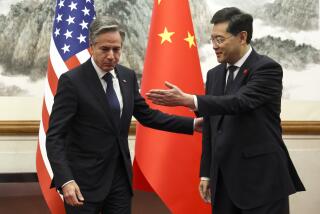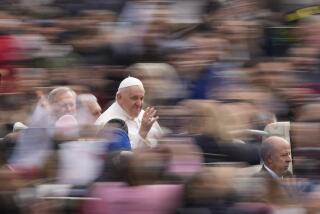China Unmoved in Vatican Stance
- Share via
BEIJING — After more than 50 years of estrangement between Beijing and the Vatican, it was hardly surprising that China’s state-run media paid little attention to the final days of Pope John Paul II.
His death was only briefly mentioned in the official media. The Foreign Ministry issued a statement of condolence, but the government announced no plans to send a representative to the funeral Friday. And on Tuesday, a Foreign Ministry spokesman warned the Holy See not to interfere in China’s “internal affairs.”
Yet some Chinese Catholics hope the election of a new pontiff could be a fresh opportunity to bring the two sides together.
“The pope has expressed many times his desire to visit China. It’s unfortunate he never made it,” said the Rev. Ma Yinglin, secretary-general of the Patriotic Catholic Assn., the government group that oversees official Catholic churches in China. “We hope the new pope could play an active role in pushing for new dialogue.”
Two issues are at the core of the impasse between China and the Vatican.
First, Beijing’s Communist government, which is technically atheist, has refused to cede any power to the Roman Catholic Church on clergy appointments.
China’s state-controlled Catholic churches do not recognize the pope’s authority. Beijing will not allow the Vatican to appoint Chinese bishops, as the Holy See does in other parts of the world, and authorities regularly harass leaders of underground churches, who risk arrest for loyalty to Rome.
On Saturday, the day the 84-year-old pontiff died, the Holy See announced that several Chinese clergymen had been arrested, some apparently for refusing to join the state-sanctioned churches.
The second major point of conflict is that the Vatican is the only government in Europe that still maintains diplomatic ties with Taiwan rather than mainland China. Beijing severed its relationship with the Holy See in 1951 after the Communists won a civil war against the Nationalists and expelled all foreign clerics.
A Foreign Ministry spokesman Tuesday reiterated Beijing’s position that the Vatican must cut ties with Taiwan and stop meddling with Chinese religious groups.
“We are ready to improve relations with the Vatican on the basis of these principles,” spokesman Qin Gang said.
John Paul, the most-traveled pope in history, never realized his wish to visit China. The pontiff’s reputation as a human rights advocate and a staunch opponent of communism who helped shatter the Soviet Union’s hold on Eastern Europe may have made it particularly awkward for Beijing to consider rapprochement with the Vatican during his reign.
Although China has traded much of its Marxist zeal for capitalist-style reforms, a deep spiritual void seems to have emerged, creating a surge of interest in religion. According to official figures, there are about 5 million Catholics in China. Other sources put the number closer to 12 million. As spiritual groups attract new members, Beijing will increasingly face questions about how to manage their growth and connections with religious institutions outside China.
“The Holy See has for a long time showed an interest in establishing diplomatic relations with China,” said John Tong, the auxiliary bishop of Hong Kong, who was appointed by the Vatican. “It’s up to China whether they would like to open the door to new negotiations.”
Even if China is ready for new dialogue, some analysts are skeptical that the time is ripe for any major changes in its relationship with the Vatican. John Paul’s successor will face myriad issues, and dealing with China may not be a priority.
“John Paul II had an urgent need to build up relations with China because he knew his life was limited and he knew he couldn’t wait,” said Anthony Lam, senior researcher at the Holy Spirit Study Center in Hong Kong. “A new pope has other urgent matters to deal with. The issue of Sino-Vatican relations is important, but not urgent.”
More to Read
Sign up for Essential California
The most important California stories and recommendations in your inbox every morning.
You may occasionally receive promotional content from the Los Angeles Times.










